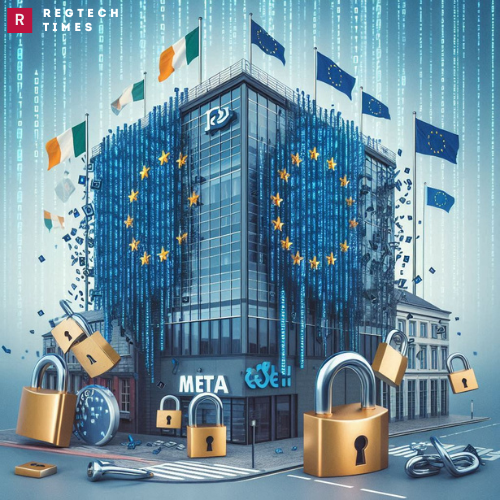In a significant regulatory move, Ireland’s Data Protection Commission (DPC) fined Meta, the parent company of Facebook and Instagram, €91 million ($102 million) for a major breach in password security. This latest fine is part of the European Union’s ongoing efforts to hold large tech corporations accountable for safeguarding user data and complying with privacy regulations. As the headquarters of many tech giants’ European operations, Ireland plays a central role in policing companies like Meta under the EU’s stringent General Data Protection Regulation (GDPR).
The Data Breach: What Went Wrong?
The data breach at the heart of this case took place in January 2019, when Meta stored millions of Facebook and Instagram user passwords in a readable, plaintext format on its internal systems. Storing passwords in this form is a serious lapse in security practices, as it leaves sensitive data vulnerable to potential misuse. While Meta has stated that there is no evidence the passwords were accessed or abused, the mere fact that this data was improperly secured created significant risks for the affected users.
What raised further concern was the company’s delayed reporting of the breach. Meta did not report the issue to the DPC until March 2019, despite the breach occurring two months earlier. The DPC officially opened an inquiry in April 2019 to investigate the extent of the breach and Meta’s handling of the situation.
Why This Fine Matters
The €91 million fine imposed on Meta is notable not just because of its size but because of what it represents: a robust response from European regulators to the inadequate security measures that led to the breach. As Graham Doyle, head of communications for the Irish DPC, pointed out, “It is widely accepted that user passwords should not be stored in plaintext,” emphasizing the risks such storage practices pose.
Meta, for its part, acknowledged the breach and stated it took immediate corrective action, claiming that the affected passwords were only temporarily stored in plaintext. A spokesperson for Meta also stressed that the company “proactively flagged this issue” to the regulator and has been cooperative throughout the inquiry process.
However, the fine serves as a reminder to all companies—especially those handling vast amounts of personal data—that they must adhere to the highest standards of data protection and security. Under GDPR, organizations are expected to implement robust safeguards and report breaches promptly, especially when such incidents may impact user privacy.
Ireland’s Role in Regulating Big Tech
Ireland’s central role in regulating the tech industry cannot be understated. As home to the European headquarters of several tech giants— including Google, Apple, and Meta—the country has become a key player in enforcing EU regulations. Under GDPR, which came into force in 2018, companies that violate data protection rules can face fines of up to €20 million or 4% of their global turnover, whichever is higher.
Xiaomi Challenges CCI’s Antitrust Report on Flipkart Over Commercial Data Exposure
This isn’t the first time Meta has faced penalties from Ireland’s DPC. Over the past few years, the commission has fined Meta several times, reflecting an increasing trend of regulators cracking down on large tech companies for privacy violations, competition abuses, and tax-related issues.
A Broader Crackdown on Tech Giants
The fine against Meta is just one part of a much larger story about global regulators tightening their grip on Big Tech. In recent years, tech giants have faced mounting pressure from governments and regulatory bodies worldwide to comply with laws that ensure fair competition, ethical use of data, and transparency in corporate practices.
For example, Ireland launched a separate investigation into Google’s artificial intelligence development earlier this month, as AI becomes a more significant area of scrutiny for regulators concerned about its ethical implications. The European Commission has also been active in imposing large fines on companies such as Apple and Google over issues related to market dominance and competition abuses.
In parallel, tech companies are increasingly competing with each other in regulatory and legal arenas. For instance, Google recently filed a complaint with the European Commission accusing Microsoft of anti-competitive practices regarding cloud services, marking a new chapter in the battle among tech titans for market dominance.
What This Means for Meta and the Industry
Although the €91 million fine represents a fraction of Meta’s massive annual revenue, the penalty sends a clear message: no company is above the law when it comes to data privacy. The EU’s aggressive enforcement of GDPR highlights its determination to set high standards for data protection and security across the digital economy.
For Meta, this is another in a series of fines and investigations, but for the industry as a whole, it highlights the need for vigilance and proactive compliance. Companies must ensure that they implement strong security measures and report any breaches in a timely manner. Failure to do so could result in both financial penalties and reputational damage.
The €91 million fine imposed on Meta by Ireland’s DPC marks an important step in the EU’s ongoing efforts to regulate the tech industry and protect user privacy. As regulators continue to crack down on lapses in data security, companies will need to take extra precautions to ensure compliance with GDPR and other privacy laws. For Meta and its peers, this fine is a reminder that data privacy and security are non-negotiable in today’s regulatory environment.


